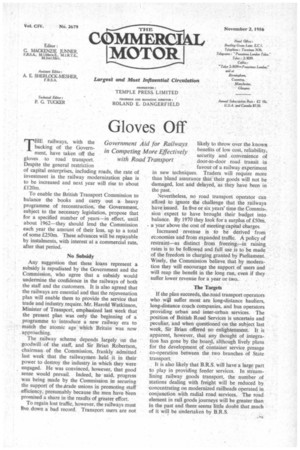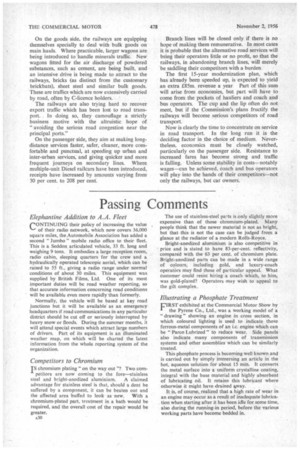Gloves Off
Page 31

Page 32

If you've noticed an error in this article please click here to report it so we can fix it.
THE railways, with the backing of the Govern ment, have taken off the gloves to road transport. Despite the general restriction of capital enterprises, including roads, the rate of investment in the railway modernization plan is to be increased and next year will rise to about £120m.
To enable the British Transport Commission to balance the books and carry out a heavy programme of reconstruction, the Government, subject to the necessary legislation, propose that for a specified number of years—in effect, until about 1962—they should lend the Commission each year the amount of their loss, up to a total of some £250m. These advances will be repayable by instalments, with interest at a commercial rate, after that period.
No Subsidy Any suggestion that these loans represent a subsidy is repudiated by the Government and the Commission, who agree that a subsidy would undermine the confidence in the railways of both the staff and the customers. It is also agreed that the railways are essential and that the rejuvenation plan will enable them to provide the service that trade and industry require. Mr. Harold Watkinson, Minister of Transport, emphasized last week that the present plan was only the beginning of a programme to introduce a new railway era to match the atomic age which Britain was now approaching.
The railway scheme depends largely on the goodwill of the staff, and Sir Brian Robertson, chairman of the Commission, frankly admitted last week that the railwaymen held it in their power to destroy the industry in which they were engaged. He was convinced, however, that good sense would prevail. Indeed, he said, progress was being made by the Commission in securing the support of the Arade unions in promoting staff efficiency, presumably because the men have been promised a share in the results of greater effort.
To regain lost traffic, however, the railways must live down a bad record. Transport users are not likely to throw over the known benefits of low cost, reliability, security and convenience of door-to-door road transit in favour of a railway experiment in new techniques. Traders will require more than bland assurance that their goods will not be damaged, lost and delayed, as they have been in the past.
Nevertheless, no road transport operator can afford to ignore the challenge that the railways have issued. In five or six years' time the Commis-. sion expect to have brought their budget into balance. By 1970 they look for a surplus of £50m. a year above the cost of meeting capital charges.
Increased revenue is to be derived from economies and from expanded traffic. A policy of restraint—as distinct from freezing—in raising rates is to be followed and full use is to be made of the freedom in charging granted by Parliament. Wisely, the Commission believe that by moderation they will encourage the support of users and will reap the benefit in the long run, even if they suffer lower revenue for a year or two.
The Targets If the plan succeeds, the—road transport operators who will suffer most are long-distance hauliers, long-distance coach companies, and bus operators providing urban and inter-urban services. The position of British Road Services is uncertain and peculiar, and when questioned on the subject last week, Sir Brian offered no enlightenment. It is apparent, however, that any thought of integration has gone by the board, although lively plans for the development of container service presage co-operation between the two branches of State transport.
It is also likely that B.R.S. will have a large part to play in providing feeder services. In streamlining railway goods transport, the number of stations dealing with freight will be reduced by concentrating on modernized railheads operated in conjunction with radial road services. The road element in rail goods journeys will be greater than in the past and there seems little doubt that much of it will be undertaken by B.R.S. On the goods side, the railways are equipping themselves specially to deal with bulk goods on main hauls. Where practicable, larger wagons are being introduced to handle minerals traffic. New wagons fitted for the air discharge of powdered substances, such as cement, are being built, and an intensive drive is being made to attract to the railways, bricks (as distinct from the customary brickbats), sheet steel and similar bulk goods. These are traffics which are now extensively carried by road, often by C-licence holders.
The railways are also trying hard to recover export traffic which has been lost to road transport. In doing so, they camouflage a strictly business motive with the altruistic hope of "avoiding the serious road congestion near the principal ports."
On the passenger side, they aim at making longdistance services faster, safer, cleaner, more comfortable and punctual, at speeding up urban and inter-urban services, and giving quicker and more frequent journeys on secondary lines. Where multiple-unit Diesel railcars have been introduced, receipts have increased by amounts varying from 30 per cent. to 208 per cent. Branch lines will be closed only if there is no hope of making them remunerative. In most cases it is probable that the alternative road services will bring their operators little or no profit, so that the railways, in abandoning branch lines, will merely be saddling their competitors with a burden The first I5-year modernization plan, which has already been speeded up, is expected to yield an extra £85m. revenue a year Part of this sum will arise from economies, but part will have to come from the pockets of hauliers and coach and bus operators. The cup and the lip often do not meet, but if the Commission's plans fructify the railways will become serious competitors of road transport.
Now is clearly the time to concentrate on service in road transport. In the long run it is the deciding factor in the choice of medium. Nevertheless, economics must be closely watched, particularly on the passenger side. Resistance to increased fares has become strong and traffic is falling. Unless some stability in costs—notably wages—can be achieved, coach and bus operators will play into the hands of their competitors—not only the railways, but car owners.
















































































































